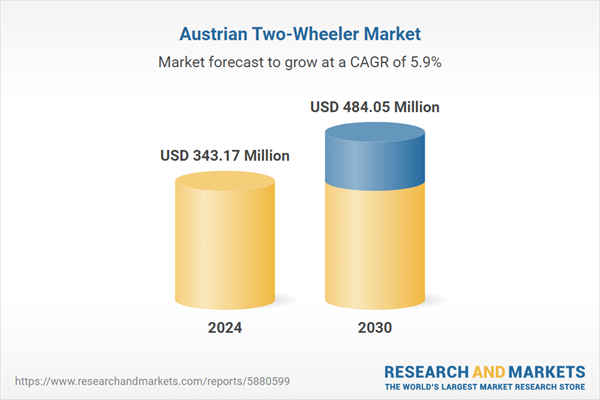Speak directly to the analyst to clarify any post sales queries you may have.
10% Free customizationThis report comes with 10% free customization, enabling you to add data that meets your specific business needs.
Supportive regulations promoting low-emission transport, along with investments in cycle paths and urban mobility infrastructure, are reinforcing this trend. Advancements in battery technology, smartphone connectivity, and smart mobility features are further enhancing user appeal and expanding the market to include daily commuters, delivery riders, and recreational users.
Changing mobility preferences in Austria, especially in cities like Vienna and Graz, are driving a shift toward compact and versatile transport. The growing presence of app-based services, telematics integration, and navigation tools is reshaping user experiences and supporting product differentiation. Environmental targets and climate commitments are encouraging a transition to electric mobility, increasing demand for zero-emission vehicles. In parallel, the rise of vehicle-sharing models, such as rentals and subscriptions, is diversifying access to two-wheelers and stimulating demand in the fleet segment.
Market Drivers
Scenic Landscapes and Motorcycle Tourism
Austria is known for its stunning landscapes, including picturesque mountains, winding roads, and beautiful countryside. These scenic routes make Austria a popular destination for motorcycle tourism. Motorcycle enthusiasts from around the world are drawn to the country to experience its natural beauty while enjoying memorable rides on its well-maintained roads. The popularity of motorcycle tourism contributes to the demand for motorcycles and scooters in the country.Key Market Challenges
Weather Dependence
Austria's climate is characterized by seasonal variations, including harsh winters with snow and cold temperatures. During the winter months, riding motorcycles and scooters becomes less practical and appealing. This weather dependence can result in reduced sales and demand for two-wheelers during the colder months, impacting the overall market performance.Key Market Trends
Safety Innovations
Safety remains a top priority in the two-wheeler market. Manufacturers are continually investing in research and development to introduce new safety innovations in their models. Advanced braking systems, anti-lock braking systems (ABS), traction control, and stability control are becoming increasingly common in modern motorcycles and scooters. Additionally, some premium models are equipped with radar-based adaptive cruise control and blind-spot detection to enhance rider safety.Key Market Players
- BMW Motorrad
- e-mobil GmbH
- Harley-Davidson
- Honda Motor Europe
- KTM AG
- NIU Technologies
- Piaggio Group
- Super Soco (Vmoto)
- Yamaha Motor Europe
- Zero Motorcycles
Report Scope:
In this report, the Austria Two-Wheeler Market has been segmented into the following categories, in addition to the industry trends which have also been detailed below:Austria Two-Wheeler Market, By Vehicle Type:
- Motorcycle
- Scooter/Moped
Austria Two-Wheeler Market, By Propulsion:
- Internal Combustion Engine
- Electric Vehicles
Austria Two-Wheeler Market, By End Use:
- Personal
- Commercial
Austria Two-Wheeler Market, By Region:
- Upper Austria
- Lower Austria
- Vienna
- Burgenland
- Rest of Austria
Competitive Landscape
Company Profiles: Detailed analysis of the major companies present in the Austria Two-Wheeler Market.Available Customizations:
With the given market data, the publisher offers customizations according to the company’s specific needs. The following customization options are available for the report.Company Information
- Detailed analysis and profiling of additional market players (up to five).
This product will be delivered within 1-3 business days.
Table of Contents
Companies Mentioned
The leading companies profiled in this Austria Two-Wheeler market report include:- BMW Motorrad
- e-mobil GmbH
- Harley-Davidson
- Honda Motor Europe
- KTM AG
- NIU Technologies
- Piaggio Group
- Super Soco (Vmoto)
- Yamaha Motor Europe
- Zero Motorcycles
Table Information
| Report Attribute | Details |
|---|---|
| No. of Pages | 70 |
| Published | September 2025 |
| Forecast Period | 2024 - 2030 |
| Estimated Market Value ( USD | $ 343.17 Million |
| Forecasted Market Value ( USD | $ 484.05 Million |
| Compound Annual Growth Rate | 5.9% |
| Regions Covered | Austria |
| No. of Companies Mentioned | 11 |









